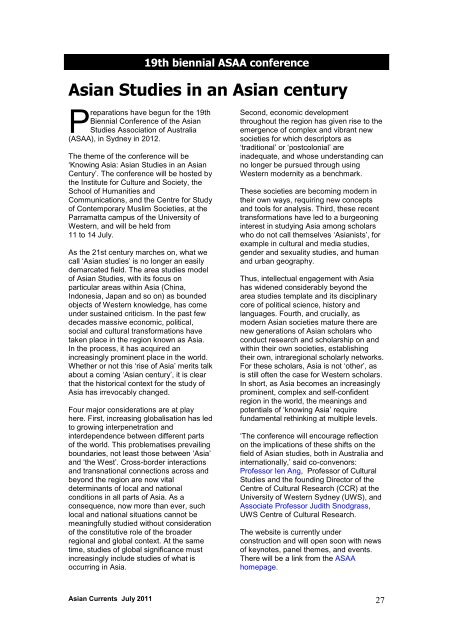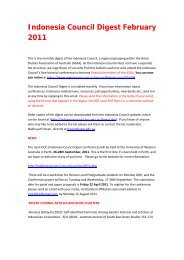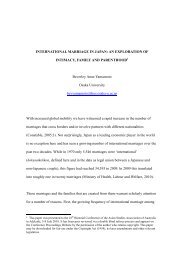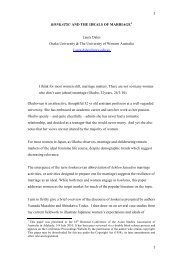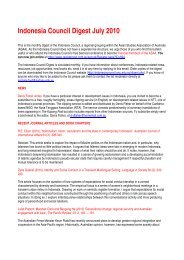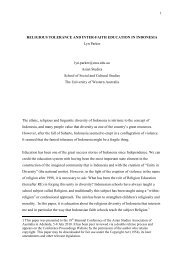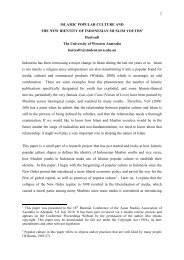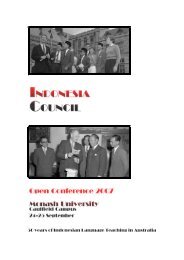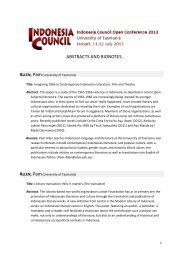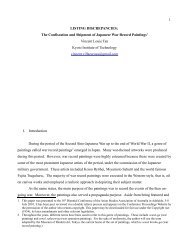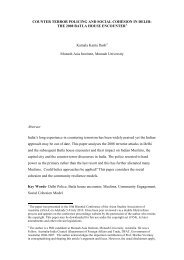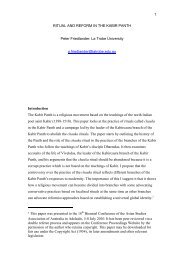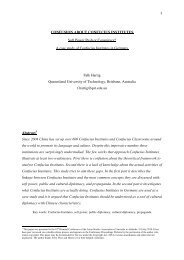Asian Currents - Asian Studies Association of Australia
Asian Currents - Asian Studies Association of Australia
Asian Currents - Asian Studies Association of Australia
Create successful ePaper yourself
Turn your PDF publications into a flip-book with our unique Google optimized e-Paper software.
19th biennial ASAA conference<br />
<strong>Asian</strong> <strong>Studies</strong> in an <strong>Asian</strong> century<br />
P<br />
reparations have begun for the 19th<br />
Biennial Conference <strong>of</strong> the <strong>Asian</strong><br />
<strong>Studies</strong> <strong>Association</strong> <strong>of</strong> <strong>Australia</strong><br />
(ASAA), in Sydney in 2012.<br />
The theme <strong>of</strong> the conference will be<br />
‗Knowing Asia: <strong>Asian</strong> <strong>Studies</strong> in an <strong>Asian</strong><br />
Century‘. The conference will be hosted by<br />
the Institute for Culture and Society, the<br />
School <strong>of</strong> Humanities and<br />
Communications, and the Centre for Study<br />
<strong>of</strong> Contemporary Muslim Societies, at the<br />
Parramatta campus <strong>of</strong> the University <strong>of</strong><br />
Western, and will be held from<br />
11 to 14 July.<br />
As the 21st century marches on, what we<br />
call ‗<strong>Asian</strong> studies‘ is no longer an easily<br />
demarcated field. The area studies model<br />
<strong>of</strong> <strong>Asian</strong> <strong>Studies</strong>, with its focus on<br />
particular areas within Asia (China,<br />
Indonesia, Japan and so on) as bounded<br />
objects <strong>of</strong> Western knowledge, has come<br />
under sustained criticism. In the past few<br />
decades massive economic, political,<br />
social and cultural transformations have<br />
taken place in the region known as Asia.<br />
In the process, it has acquired an<br />
increasingly prominent place in the world.<br />
Whether or not this ‗rise <strong>of</strong> Asia‘ merits talk<br />
about a coming ‗<strong>Asian</strong> century‘, it is clear<br />
that the historical context for the study <strong>of</strong><br />
Asia has irrevocably changed.<br />
Four major considerations are at play<br />
here. First, increasing globalisation has led<br />
to growing interpenetration and<br />
interdependence between different parts<br />
<strong>of</strong> the world. This problematises prevailing<br />
boundaries, not least those between ‗Asia‘<br />
and ‗the West‘. Cross-border interactions<br />
and transnational connections across and<br />
beyond the region are now vital<br />
determinants <strong>of</strong> local and national<br />
conditions in all parts <strong>of</strong> Asia. As a<br />
consequence, now more than ever, such<br />
local and national situations cannot be<br />
meaningfully studied without consideration<br />
<strong>of</strong> the constitutive role <strong>of</strong> the broader<br />
regional and global context. At the same<br />
time, studies <strong>of</strong> global significance must<br />
increasingly include studies <strong>of</strong> what is<br />
occurring in Asia.<br />
Second, economic development<br />
throughout the region has given rise to the<br />
emergence <strong>of</strong> complex and vibrant new<br />
societies for which descriptors as<br />
‗traditional‘ or ‗postcolonial‘ are<br />
inadequate, and whose understanding can<br />
no longer be pursued through using<br />
Western modernity as a benchmark.<br />
These societies are becoming modern in<br />
their own ways, requiring new concepts<br />
and tools for analysis. Third, these recent<br />
transformations have led to a burgeoning<br />
interest in studying Asia among scholars<br />
who do not call themselves ‗<strong>Asian</strong>ists‘, for<br />
example in cultural and media studies,<br />
gender and sexuality studies, and human<br />
and urban geography.<br />
Thus, intellectual engagement with Asia<br />
has widened considerably beyond the<br />
area studies template and its disciplinary<br />
core <strong>of</strong> political science, history and<br />
languages. Fourth, and crucially, as<br />
modern <strong>Asian</strong> societies mature there are<br />
new generations <strong>of</strong> <strong>Asian</strong> scholars who<br />
conduct research and scholarship on and<br />
within their own societies, establishing<br />
their own, intraregional scholarly networks.<br />
For these scholars, Asia is not ‗other‘, as<br />
is still <strong>of</strong>ten the case for Western scholars.<br />
In short, as Asia becomes an increasingly<br />
prominent, complex and self-confident<br />
region in the world, the meanings and<br />
potentials <strong>of</strong> ‗knowing Asia‘ require<br />
fundamental rethinking at multiple levels.<br />
‗The conference will encourage reflection<br />
on the implications <strong>of</strong> these shifts on the<br />
field <strong>of</strong> <strong>Asian</strong> studies, both in <strong>Australia</strong> and<br />
internationally,‘ said co-convenors:<br />
Pr<strong>of</strong>essor Ien Ang, Pr<strong>of</strong>essor <strong>of</strong> Cultural<br />
<strong>Studies</strong> and the founding Director <strong>of</strong> the<br />
Centre <strong>of</strong> Cultural Research (CCR) at the<br />
University <strong>of</strong> Western Sydney (UWS), and<br />
Associate Pr<strong>of</strong>essor Judith Snodgrass,<br />
UWS Centre <strong>of</strong> Cultural Research.<br />
The website is currently under<br />
construction and will open soon with news<br />
<strong>of</strong> keynotes, panel themes, and events.<br />
There will be a link from the ASAA<br />
homepage.<br />
<strong>Asian</strong> <strong>Currents</strong> July 2011 27


